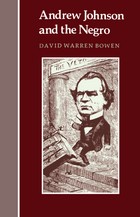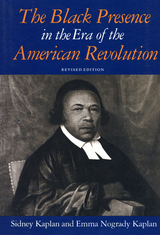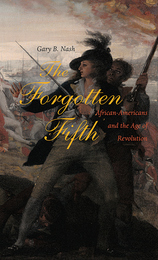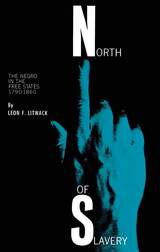
“Bowen has probed the working of Andrew Johnson’s mind. His analysis illuminates the character of East Tennessee’s tailor president and the contradictions—as well as the consistency—of his policies toward slavery and toward blacks.”— LaWanda Cox, author of Lincoln and Black Freedom: A Study in Presidential Leadership
Andrew Johnson, who was thrust into the office of presidency by Lincoln’s assassination, described himself as a “friend of the colored man.” Twentieth century historians have assessed Johnson’s racial attitudes differently.
In his revisionist study, David Bowen explores Johnson’s racist bias more deeply than other historians to date, and maintains that racism was, in fact, a prime motivator of his policies as a public official. A slave owner who defended the institution until the Civil War, Jonson accepted emancipation. Once Johnson became president, however, his racial prejudice reasserted itself as a significant influence on his Reconstruction policies.
Bowen’s study deftly analyzes the difficult personality of the seventeenth president and the political influences that molded him. This portrait of a man who, despite his many egalitarian notions, practiced racism, will intrigue historians and readers interested in Civil War and Reconstruction history alike.
The Author: David Warren Bowen, formerly on the staff of The Papers of Andrew Johnson, teaches history at Livingston University

The book is a revised and expanded edition of the authors' classic catalog that accompanied a pioneering exhibition mounted in 1973 by the National Portrait Gallery.

As the United States gained independence, a full fifth of the country's population was African American. The experiences of these men and women have been largely ignored in the accounts of the colonies' glorious quest for freedom. In this compact volume, Gary B. Nash reorients our understanding of early America, and reveals the perilous choices of the founding fathers that shaped the nation's future.
Nash tells of revolutionary fervor arousing a struggle for freedom that spiraled into the largest slave rebellion in American history, as blacks fled servitude to fight for the British, who promised freedom in exchange for military service. The Revolutionary Army never matched the British offer, and most histories of the period have ignored this remarkable story. The conventional wisdom says that abolition was impossible in the fragile new republic. Nash, however, argues that an unusual convergence of factors immediately after the war created a unique opportunity to dismantle slavery. The founding fathers' failure to commit to freedom led to the waning of abolitionism just as it had reached its peak. In the opening decades of the nineteenth century, as Nash demonstrates, their decision enabled the ideology of white supremacy to take root, and with it the beginnings of an irreparable national fissure. The moral failure of the Revolution was paid for in the 1860s with the lives of the 600,000 Americans killed in the Civil War.
The Forgotten Fifth is a powerful story of the nation's multiple, and painful, paths to freedom.

Privileged beyond other members of his race, yet sharing their disadvantages, the young John Mercer Langston stood in an uncertain position in the years before the Civil War. His confrontation with a critical personal question was tempered by a crucial national reality: from what sources could he derive his model of manhood and human dignity? This book explores John Mercer Langston's decisions to work out his destiny through the resources and fortunes of the northern black community.
Although Langston, who died in 1897, was a black Politician, orator, lawyer, intellectual, diplomat, and congressman, he has never before been accorded fullscale biographical treatment. Born free on a Virginia plantation, Langston graduated from Oberlin College in 1849, gained admission to the Ohio bar, and by the age of twenty-five, became the first black American to hold elective office. Still in the years of his political apprenticeship, he promoted black civil rights, helped shape the nascent Republican party, aided in the Oberlin-Wellington Rescue and John Brown's raid, and recruited black soldier for the Union cause. In 1864 he became the first president of the National Equal Rights League.
From an extensive search of primary sources, the authors construct a richly textured picture of the beginnings of Langston's career as a national black leader. More than a biography, the work also incorporates social and political history. Embedded firmly in a study of northern black community life and activism, it reveals the degree to which Langston and his cohorts set the terms of the fight for freedom and citizenship.

"For a searching examination of the North Star Legend we are indebted to Leon F. Litwack. . . ."—C. Vann Woodward, The American Scholar
READERS
Browse our collection.
PUBLISHERS
See BiblioVault's publisher services.
STUDENT SERVICES
Files for college accessibility offices.
UChicago Accessibility Resources
home | accessibility | search | about | contact us
BiblioVault ® 2001 - 2024
The University of Chicago Press









